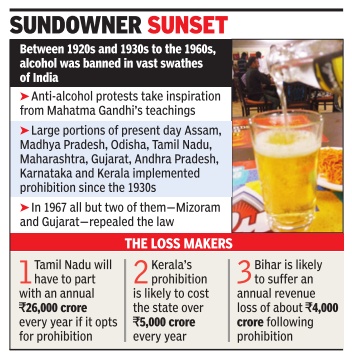Prohibition: India
This is a collection of articles archived for the excellence of their content. |
Contents |
History
Liquor prohibition rules

From the archives of India Today , July 27, 2008
Many states tried prohibition but had to backtrack later
• The Bansi Lal government kept its election promise and introduced prohibition in Haryana in 1996. But bordered by three states, implementing the policy became difficult, giving rise to liquor mafias. Besides, the state was losing about Rs 1,100 crore a year. The policy was repealed after only 21 months.
• The N.T.Rama Rao-led TDP government declared Andhra Pradesh dry in 1995 with a clear eye on the women’s vote but prohibition was repealed by his son-in-law N. Chandrababu Naidu who seized power following a family coup in 1997.
• Tamil Nadu, dry until 1971, went wet only to revert to prohibition in 1974.Repealed dry laws in 1981 and wet since.
Legality of prohibition
States could ban public consumption of cigarettes, alcohol: SC
The Times of India Jan 01 2016
W hile upholding the Ke rala government's decision to bar all hotels except five-star establishments from serving liquor, the Supreme Court also ruled that states could ban public consumption of cigarettes and alcohol even if they had not taken any step to restrict production of these two intoxicants, reports Dhananjay Mahapatra.
“Consumption of tobacco and liquor is deleterious to health... Banning public consumption of either cannot be constrained,“ said an SC bench of Justices Vikramajit Sen and S K Singh.
Economics
The effect of SC’s order banning liquor outlets on highways
Boby Kurian, SC order puts 42% liquor biz in limbo, Jan 19, 2017: The Times of India
After raising a toast to road safety in their campaigns for years, global drinks giants Diageo and Pernod Ricard have fallen silent on last month's Supreme Court order banning liquor outlets and bars on national and state highways.The reason: They , along with other Indian distillers, are probably bracing for a significant business disruption with data suggesting that 42% of liquor vends in the country face dislocation when the court directive takes effect on April 1.
In India, 330 million cases (9 litres each) of branded liquor are sold through more than 64,000 licensed outlets. Nearly 26,800 of them need to be relocated or closed down, according to industry data vetted by the country's top distillers.
On December 15, the apex court ruled that shops and bars selling all forms of liquor within a 500-meter radius of highways should cease to exist citing the rising incidence of alcoholfuelled road accidents. The pub lic works department is expected to determine whether the vends would attract the court gag and must relocate, a complex process which requires the nod of excise departments and local civic bodies.
“While we fully respect the court order, the fact is that most Indian urban agglomerations are centred around highways, making it disruptive for the alcoholic beverages industry .This dislocation of retail trade comes at a very inopportune moment. I have never seen a period worst than the current financial year in my 38-year-old career,“ said Deepak Roy , vice chairman of Allied Blenders & Distillers (ABD), the third largest distiller in the country.
The domestic liquor consumption has swung negative, with 1% degrowth and volume sales declining for major companies like Diageocontrolled United Spirits and ABD. Pernod Ricard is reporting 2% growth, but is staring at its lowest India growth. Predictably , United Spirits and Pernod Ricard declined to comment on the story.
Several retail associations are moving a review petition in the top court, the fate of which would be known in the coming days. These petitioners are likely to plead that less than 6% of road accidents in the country are alcohol-induced ones. Roy said the impending dislocation has the potential to push a large part of the trade underground, or causing them to dry up. “The fact that we are perceived as a sin industry and a heavily regulated one reduces the manoeuvring space,“ he added.
The impact on liquor trade will be the most in hilly regions like Meghalaya, Jharkhand and Uttarakhand and densely populated markets -which would include the high-profile business corridors in Gurgaon and even the Western Express highway in Mumbai. Most big states such as Maharashtra, Telangana, Andhra, Rajasthan and West Bengal will see between 40% and 60% of the retail trade facing the axe. Telangana is considering a move to denotify state highways in urban centres as excise revenue from the liquor trade fills the coffers of several federal governments.
Mizoram
See also
Alcohol and the Indian physique
Prohibition: India